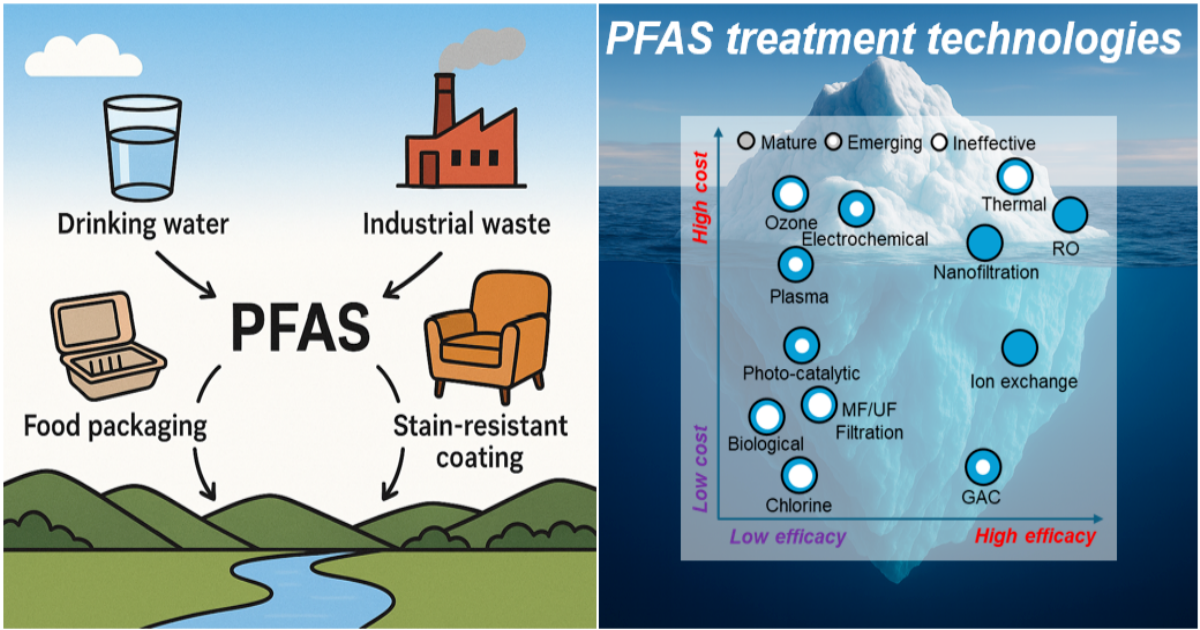New Challenges in PFAS Removal from Contaminated Water
A special issue of Water (ISSN 2073-4441). This special issue belongs to the section "Water Quality and Contamination".
Deadline for manuscript submissions: 30 June 2026 | Viewed by 75

Special Issue Editors
2. Department of Civil and Environmental Engineering, Colorado School of Mines, Golden, CO, USA
Interests: PFAS treatment; PFAS fate and transport; water quality
Interests: environmental chemistry; emerging contaminants; PFAS; bioremediation
Interests: hydrogeochemistry; colloids; emergent contaminants; nanoparticles
Special Issues, Collections and Topics in MDPI journals
Special Issue Information
Dear Colleagues,
This Special Issue, titled "New Challenges in PFAS Removal from Contaminated Water," addresses the pressing global need for advanced solutions to remediate water sources contaminated with per- and polyfluoroalkyl substances (PFAS). While conventional technologies such as granular activated carbon and ion exchange are established for certain long-chain PFAS, they face significant limitations against the vast and diverse universe of emerging PFAS, including short-chain alternatives and complex precursors.
This call for papers seeks to highlight cutting-edge research and critical papers that tackle these multifaceted challenges. We welcome contributions focused on the development and optimization of destructive technologies, such as advanced oxidation/reduction processes, plasma, and sonolysis, capable of mineralizing resilient PFAS structures. Furthermore, we encourage submissions on novel adsorbents, membrane technologies, and concentration techniques that offer enhanced selectivity, capacity, and cost-effectiveness. Studies addressing the critical gaps in managing the treatment of waste streams, conducting lifecycle assessments, and implementing these solutions at pilot and full scale are also of high interest. The ultimate goal of this Special Issue is to foster a multidisciplinary dialog and accelerate the development of robust, integrated strategies to safeguard water resources against the enduring threat of PFAS contamination.
Dr. Chuhui Zhang
Dr. Yue Zhi
Prof. Dr. Philippe Le Coustumer
Guest Editors
Manuscript Submission Information
Manuscripts should be submitted online at www.mdpi.com by registering and logging in to this website. Once you are registered, click here to go to the submission form. Manuscripts can be submitted until the deadline. All submissions that pass pre-check are peer-reviewed. Accepted papers will be published continuously in the journal (as soon as accepted) and will be listed together on the special issue website. Research articles, review articles as well as short communications are invited. For planned papers, a title and short abstract (about 250 words) can be sent to the Editorial Office for assessment.
Submitted manuscripts should not have been published previously, nor be under consideration for publication elsewhere (except conference proceedings papers). All manuscripts are thoroughly refereed through a single-blind peer-review process. A guide for authors and other relevant information for submission of manuscripts is available on the Instructions for Authors page. Water is an international peer-reviewed open access semimonthly journal published by MDPI.
Please visit the Instructions for Authors page before submitting a manuscript. The Article Processing Charge (APC) for publication in this open access journal is 2600 CHF (Swiss Francs). Submitted papers should be well formatted and use good English. Authors may use MDPI's English editing service prior to publication or during author revisions.
Keywords
- PFAS
- per- and polyfluoroalkyl substances
- treatment
- destructive technologies
- adsorption
Benefits of Publishing in a Special Issue
- Ease of navigation: Grouping papers by topic helps scholars navigate broad scope journals more efficiently.
- Greater discoverability: Special Issues support the reach and impact of scientific research. Articles in Special Issues are more discoverable and cited more frequently.
- Expansion of research network: Special Issues facilitate connections among authors, fostering scientific collaborations.
- External promotion: Articles in Special Issues are often promoted through the journal's social media, increasing their visibility.
- Reprint: MDPI Books provides the opportunity to republish successful Special Issues in book format, both online and in print.
Further information on MDPI's Special Issue policies can be found here.






